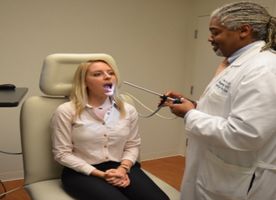Salivary Gland Tumor Removal in Vietnam
Search and Compare the Best Clinics and Doctors at the Lowest Prices for Salivary Gland Tumor Removal in Vietnam




































































































































No Time?
Tell us what you're looking for and we'll reach out to the top clinics all at once
What does a Salivary Gland Tumor Removal Procedure Involve?
You are given a general anesthetic so you are unconscious during the surgery. If the tumor is located in the parotid gland, your surgeon makes an incision that extends from the front of your ear to your neck to access the gland, then they carefully remove as much of the tumor as possible without harming your facial nerve. If the tumor has spread into deeper tissue, your surgeon may remove the entire gland.
How Long Should I Stay in Vietnam for a Salivary Gland Tumor Removal Procedure?
Most people are required to stay in the hospital for one to four days following the surgery. However, you should not leave Vietnam immediately after you are discharged from the hospital since you need to allow your body time to heal and attend follow-up checkups. The recommended length of stay is about 10 to 14 days.
What's the Recovery Time for Salivary Gland Tumor Removal Procedures in Vietnam?
The total recovery time until you do not feel any numbness and you are allowed to go back to your full routine can take as long as six months. However, you should be able to drive and do some light activities within 1-2 weeks. If your job is not too physical and does not involve heavy lifting, you may also be able to return to work in about two weeks.
What sort of Aftercare is Required for Salivary Gland Tumor Removal Procedures in Vietnam?
Your doctor will give you a set of instructions that you need to follow. It is really important for you to change your lifestyle by having regular exercise (aerobic exercise, such as walking, swimming, or biking) and following a healthy, well-balanced diet. You may also need to attend follow-up appointments, particularly if your tumor is cancerous, to make sure that the tumor has not returned and there are no new growths.
What's the Success Rate of Salivary Gland Tumor Removal Procedures in Vietnam?
Saliva gland tumor removal is a complicated surgery, but it is generally safe and effective if done by a skilled professional. All surgery carries some side effects and risks, and salivary gland tumor removal is no exception. The side effects and risks include bleeding, infection, blood clots, damaged nerve, lose control of facial muscles, Frey syndrome, change in appearance, and problems with the anesthesia.
Are there Alternatives to Salivary Gland Tumor Removal Procedures in Vietnam?
If your tumor is cancerous, your doctor may recommend you to undergo chemotherapy or radiation therapy to kill cancer cells. Make sure to talk to your doctor about the best treatment option for your specific case.
This information has been accurately sourced and verified by a medical professional for its accuracy, however, we strongly recommend you to consult with your doctor before pursuing medical procedures overseas.
















